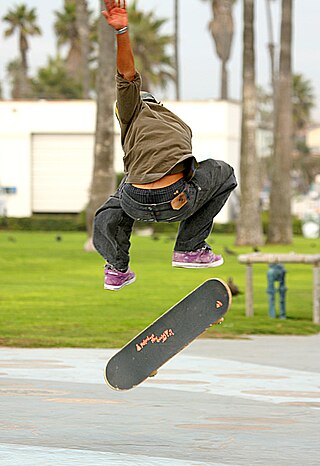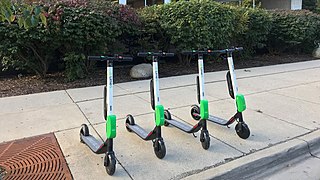
A Segway is a two-wheeled, self-balancing personal transporter device invented by Dean Kamen. It is a registered trademark of Segway Inc. It was brought to market in 2001 as the Segway HT, and then subsequently as the Segway PT.HT is an initialism for "human transporter" and PT for "personal transporter."

The BMW X3 is an SUV manufactured by BMW since 2003, based on the BMW 3 Series platform. Now in its fourth generation, BMW markets the car as a Sports Activity Vehicle, the company's proprietary descriptor for its X-line luxury vehicles.

A kick scooter is a human-powered street vehicle with a handlebar, deck, and wheels propelled by a rider pushing off the ground with their leg. Today the most common scooters are made of aluminum, titanium, and steel. Some kick scooters made for younger children have 3 to 4 wheels and are made of plastic and do not fold. High-performance kickbikes are also made. A company that had once made the Razor Scooters revitalized the design in the mid-nineties and early two-thousands. Three-wheel models where the frame forks into two decks are known as Y scooters or trikkes.

Tesla, Inc. is an American multinational automotive and clean energy company. Headquartered in Austin, Texas, it designs, manufactures and sells battery electric vehicles (BEVs), stationary battery energy storage devices from home to grid-scale, solar panels and solar shingles, and related products and services.

A skateboard is a type of sports equipment used for skateboarding. It is usually made of a specially designed 7–8-ply maple plywood deck and has polyurethane wheels attached to the underside by a pair of skateboarding trucks.

An electric skateboard is a personal transporter based on a skateboard. The speed is usually controlled by a wireless hand-held throttle remote, or rider body weight-shifting between front of the board for forward motion and rear for braking. As for the direction of travel to the right or left, it is adjusted by tilting the board to one side or the other. The classification of electric skateboards and legality of their use on roads or pavements varies between countries.
Gogoro Inc. is a Taiwanese company that developed a battery-swapping refueling platform for urban electric two-wheel scooters, mopeds and motorcycles. It also develops its own line of electric scooters and offers its own vehicle innovations to vehicle maker partners like Hero, Yamaha, Aeon Motor, PGO, eReady, and eMOVING. Gogoro also operates GoShare, a rideshare service, in Taiwan and Ishigaki Island in Japan.

A self-balancing scooter is a self-balancing personal transporter consisting of two motorized wheels connected to a pair of articulated pads on which the rider places their feet. The rider controls the speed by leaning forward or backward, and direction of travel by twisting the pads.

Faraday Future Inc. is an American startup technology company founded in 2014 focused on the development of electric vehicles. Based in Los Angeles, California, it began producing vehicles in 2023 and markets them in the United States and China.

Onewheel is a self-balancing electric skateboard with a single tire, used as a means of transportation and for boardsports. Riders place their feet on either side of the tire to face sideways, leaning forward to accelerate and leaning backward to slow down. The board was engineered to emulate the feeling of snowboarding on powder.
Fisker Inc. is an American automotive company founded by Danish automotive designer Henrik Fisker and his wife Geeta Gupta-Fisker.

Contemporary Amperex Technology Co., Limited (CATL) is a Chinese battery manufacturer and technology company founded in 2011 that specializes in the manufacturing of lithium-ion batteries for electric vehicles and energy storage systems, as well as battery management systems (BMS). The company is the biggest EV and energy storage battery manufacturer in the world, with a global market share of around 37% and 40% respectively in 2023. The company is headquartered in the city of Ningde in China's Fujian province.

The Lucid Air is a battery electric 4-door luxury sedan made by Lucid Motors. The car was announced in December 2016 and sold starting in 2021.

A personal transporter is any of a class of compact, mostly recent, motorised micromobility vehicle for transporting an individual at speeds that do not normally exceed 25 km/h (16 mph). They include electric skateboards, kick scooters, self-balancing unicycles and Segways, as well as gasoline-fueled motorised scooters or skateboards, typically using two-stroke engines of less than 49 cc (3.0 cu in) displacement. Many newer versions use recent advances in vehicle battery and motor-control technologies. They are growing in popularity, and legislators are in the process of determining how these devices should be classified, regulated and accommodated during a period of rapid innovation.

Neutron Holdings, Inc., doing business under the name Lime, formerly LimeBike, is an American transportation company based in San Francisco, California. It runs electric scooters, electric bikes and electric mopeds in more than 200 cities in nearly 30 countries around the world. The system offers dockless vehicles that users find and unlock via a smartphone app that knows the location of available vehicles via GPS.

Skip was a San Francisco-based company which provided a scooter-sharing system in several American cities. The company was founded by Matt Tran, Mike Wadhera, and Sanjay Dastoor during Y Combinator's winter 2018 class. Skip differentiated itself from competitors by making sturdier scooters with larger batteries, offering instructional classes, and working with cities before rolling out. It was acquired by Helbiz in 2020 and filed for Chapter 7 bankruptcy in August 2021.

The Cadillac Lyriq is a battery electric mid-size luxury crossover SUV manufactured and marketed by the Cadillac subdivision of General Motors. As Cadillac's first fully electric vehicle, and the first GM production vehicle using the BEV3 platform, the Lyriq introduces a new version of GM's Super Cruise semi-autonomous driving system.

The GM BEV2 platform is an automotive platform made by General Motors designed specifically for small electric vehicles. Multiple divisions of the LG Corporation have been instrumental in construction in addition to GM's contributions to the platform.

Canoo Inc. is an American automotive company based in Torrance, California, that develops and manufactures electric vehicles. Canoo's research & development team is based in Michigan, in the Detroit region, and production operations are in Justin, Texas. The company also plans to produce commercial electric vehicles such as vans for fleet, vehicle rental and ride sharing services.

Niu Technologies is an electric scooter company headquartered in Beijing, China. Yan Li has been its CEO and COO since December 2017.


















